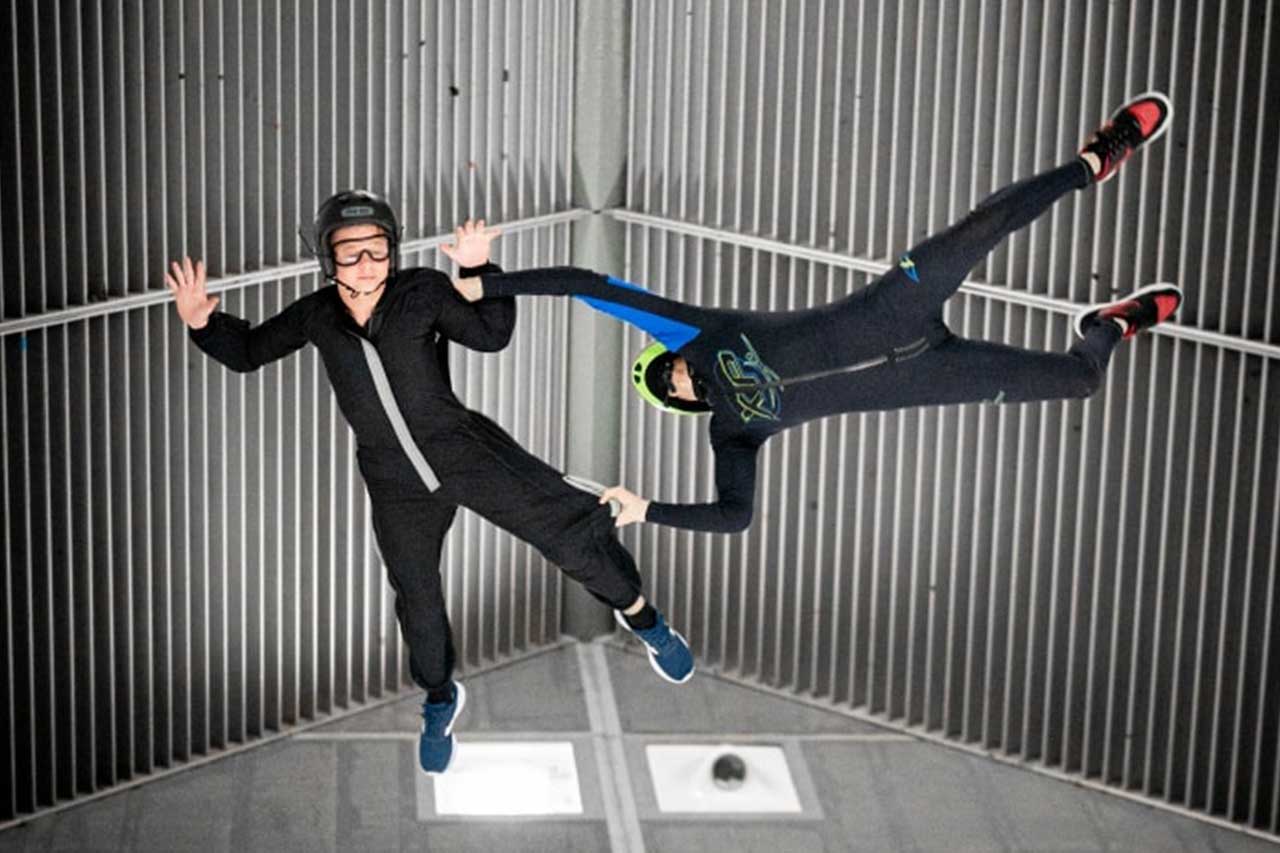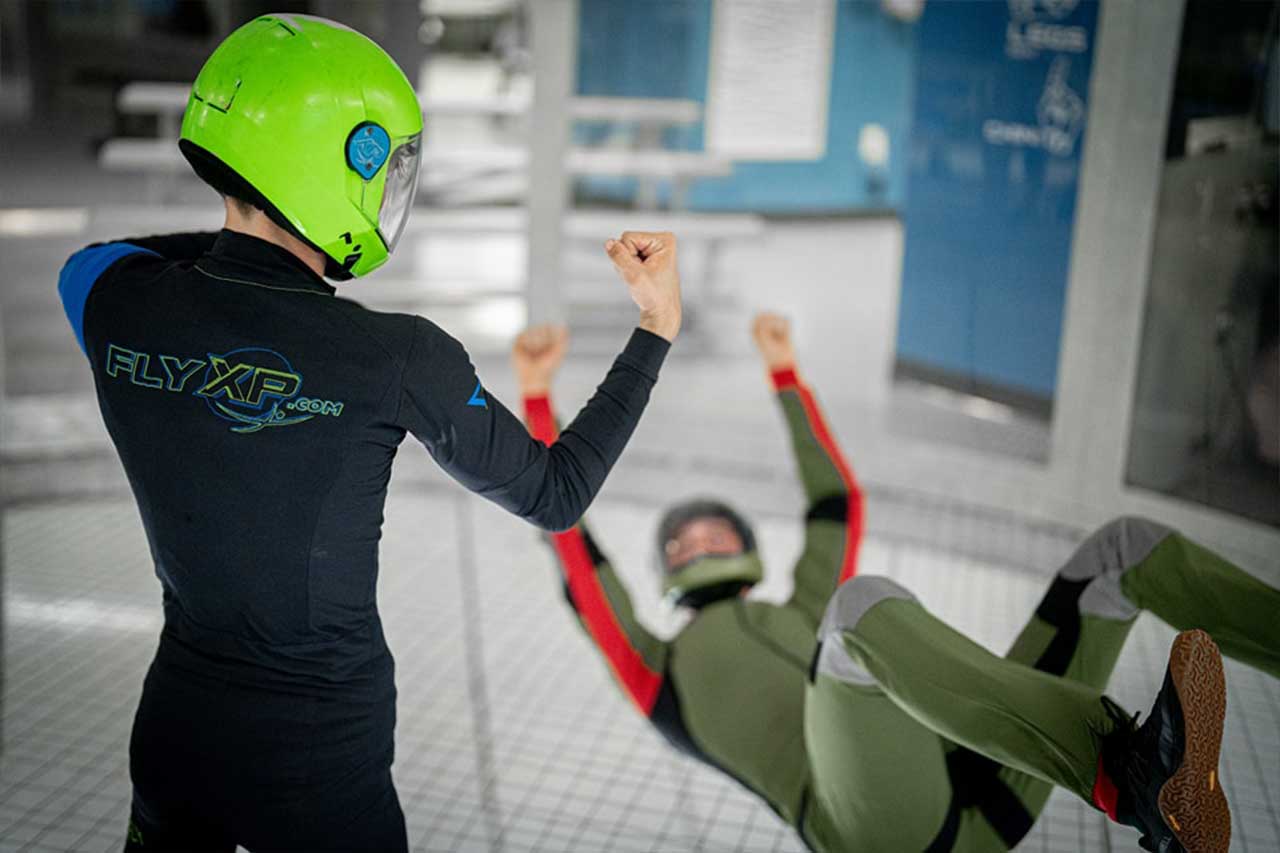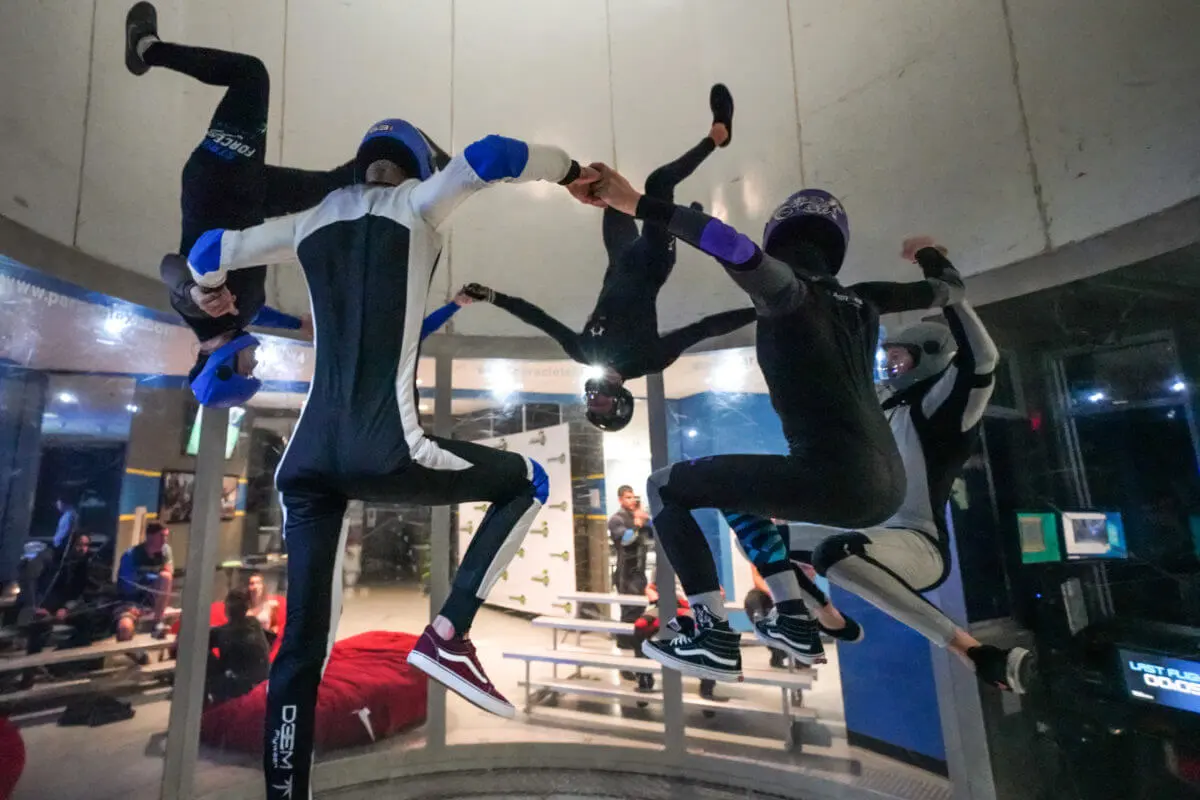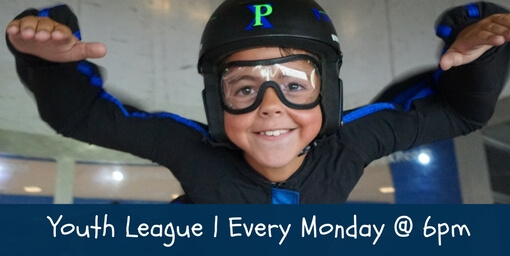Does Indoor Skydiving Make You Sick?
Friday, August 16, 2024
- Team XP
- 8/16/24
- 0
- Indoor Skydiving
Indoor skydiving offers an exhilarating experience that closely mimics the sensation of freefalling during a real skydive, but from inside of a vertical wind tunnel! Indoor skydiving – otherwise known as bodyflight – is accessible to people of most ages (three and up!) and of all abilities, making it a popular choice for those seeking adventure without jumping out of an actual airplane. However, many interested flyers wonder whether indoor skydiving can make them feel sick, especially those who normally fret over roller coasters.
In an effort to help you prepare as best as possible for your flying adventure, let’s explore whether or not indoor skydiving can make you sick, identify some potential causes of the sickness, and provide you with some guidance on how to combat that tummy tickling feeling while on your flight.

How Does Indoor Skydiving Work?
First, let’s look at how indoor skydiving works to get a better understanding of how it may affect your body! Indoor skydiving is designed to replicate the sensation of freefall by using powerful fans (we’re talking 2164 horsepower, baby!) that create a column of air strong enough to lift you up off of the ground – allowing you to fly and maneuver your body mid-air! The experience is a sensation that you’ll never forget that many describe as a thrilling combination of awe and serenity.
Does Indoor Skydiving Make Your Stomach Drop?
Many first-time flyers relate indoor skydiving (and outdoor skydiving for that matter) to the same sensations experienced while riding a roller coaster. If you’ve been on roller coasters, you know the one we’re talking about – the silly, tummy-turning, stomach-dropping sensation. Some people love the feeling while others despise it because it makes them feel iffy.
You won’t necessarily experience a “falling feeling” or “stomach drop” while you are indoor skydiving, because a normal flight typically happens a few feet off of the ground – or on a metal net that covers the wind tunnel hole – keeping you from falling all of the way down. Your instructor will also be right alongside you to guide you and assist you during your flight.
NOW, with that being said, you will have the option to have the instructor grab hold of you and fly you up towards the top of the tunnel, zooming back down towards the ground and back up again – this “high flight” mayyyy bring about some butterflies in your tummy. But if you’re into that sort of thing, our guests usually agree that it is one of the best parts of the flying experience. If it is offered by your instructor and you’re feeling up to it, we say GO FOR IT! If not, no worries, just let your instructor know the high flight is a hard pass.

Does Indoor Skydiving Make You Sick?
No. Typically indoor skydiving will not make you sick. However, if you are already experiencing symptoms of sickness it could exacerbate them, causing you to get sick.
Potential Causes of Sickness During Indoor Skydiving
While it is important to note that experiencing sickness during indoor skydiving is very rare, understanding the potential causes can help alleviate any concerns. Let’s cover some of the possible reasons why someone might feel unwell during or after indoor skydiving.
1. Motion Sickness
Motion sickness occurs when the brain receives conflicting signals from the inner ear, eyes, and other parts of the body. In the case of indoor skydiving, the sensation of floating or the movements made while adjusting your body position can sometimes trigger this response – particularly those who are prone to motion sickness. Getting motion sickness while indoor skydiving is possible, and also extremely rare.
Symptoms of Motion Sickness:
- Nausea
- Dizziness
- Vomiting
2. Vertigo
Vertigo is the sensation of spinning or dizziness, often caused by issues related to the inner ear. The continuous movement and changes in orientation during indoor skydiving can occasionally provoke vertigo in some individuals. Most individuals who experience vertigo on a normal basis typically do not have any issues with dizziness or sickness while on their flight.
Symptoms of Vertigo:
- Dizziness
- Balance issues
- Feeling of spinning even when stationary
3. Anxiety and Nervousness
The anticipation and excitement of indoor skydiving can sometimes lead to anxiety or nervousness, which is totally normal! The adrenaline rush combined with the unfamiliar environment can cause some people to feel uneasy and queasy.
Symptoms of Anxiety:
- Rapid heart rate
- Sweating
- Stomach discomfort
4. Pre-existing Conditions
Certain pre-existing medical conditions, especially those related to the inner ear or vestibular system like Meniere’s disease, can increase the likelihood of feeling sick during indoor skydiving.
Symptoms vary depending on the specific conditions but often include dizziness, nausea, and difficulty maintaining balance. If you have any of these known conditions, it is important to consult with your healthcare provider before participating in indoor skydiving.
5. Coming Unprepared (Physically)
Indoor skydiving is technically a sport and should be treated as such. And just as you should prepare your body for any other physical activity, preparing your body for flight is an essential element to having a great experience. Choosing to skip a meal, eating too much, not getting enough rest, and/or consuming alcohol before your flight are all recipes for a not-so-good time.

Tips to Prevent Sickness During Indoor Skydiving
Whether or not the above reasons are cause for concern for you, it is best to take the necessary steps to prepare yourself for an awesome indoor skydiving experience. Here are some helpful tips to ensure a smooth and enjoyable flight!
1. Eat Lightly Beforehand
Eating a heavy meal, or anything that normally makes you feel less-than-great can increase the risk of nausea. Instead, opt for light, easily digestible foods that won’t weigh you down. Try to eat a small meal about an hour before your flight and focus on only ingesting “light” foods such as fruits, salads, wraps, or any food that gives you energy rather than making you lethargic.
2. Stay Hydrated
Proper hydration is key to feeling your best during any physical activity, including indoor skydiving. Drink plenty of water before your flight, but avoid drinking too much water right before your session begins – sometimes that’s uncomfortable.
3. Avoid Alcohol
Attempting to fly drunk or hungover is a sure way to cause issues during your flight – with one of those potential issues being vomiting. It is best to avoid alcohol at least eight hours before your flight.
4. Consider Taking Motion Sickness Medication
If you’re prone to motion sickness, consider taking over-the-counter medicine such as Dramamine before your flight. It’s always a good idea to consult with a healthcare provider to ensure that these medications are appropriate for you.
5. Talk About Your Feels
As always, it’s important to communicate with your instructor on how you’re feeling. If you start to feel unwell at any point, please do not hesitate to communicate with us. We can help provide guidance, make adjustments to your flight, or even pause the session if needed. Remember, indoor skydiving instructors are trained professionals – we are here to help you have the best experience possible. Your comfort and safety is our number one priority!
Don’t let the fear of discomfort hold you back – come prepared, take the leap, and create unforgettable memories with our one-of-a-kind wind tunnel. Book your flight with Paraclete XP Indoor Skydiving today!
Copyright © 2025, Paraclete XP Indoor Skydiving, All Rights Reserved.
DropZone Web Design & Marketing by Beyond Marketing, LLC
